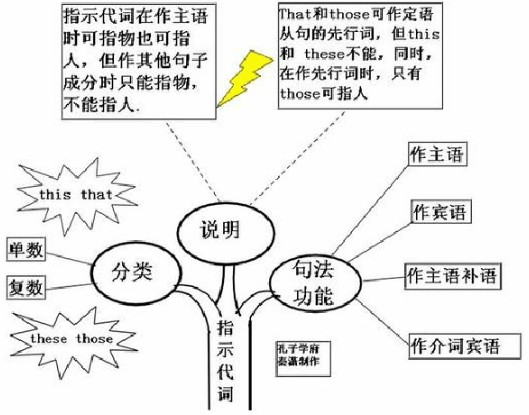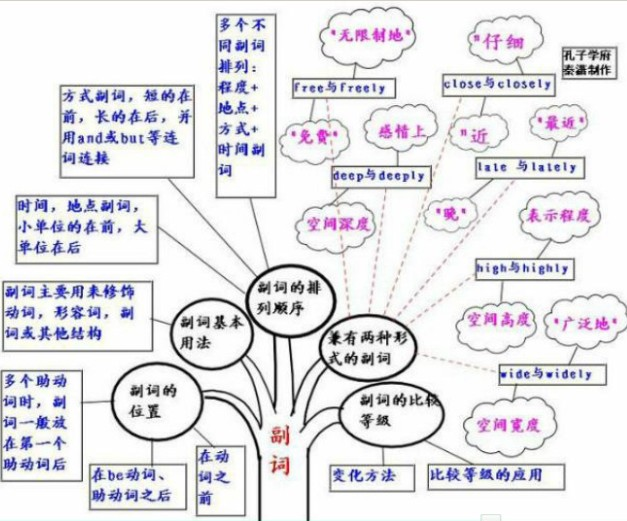本试题 “When you go abroad, you'll find the food at home is _____ better than _____ outside.A. far; thatB. much; the oneC. very; thatD. a lot; one” 主要考查您对指示代词
副词
等考点的理解。关于这些考点您可以点击下面的选项卡查看详细档案。
- 指示代词
- 副词
指示代词的概念:
指示代词是表示指示概念的代词,即用来指示或标识人或事物的代词。主要有this,that,these,those。
this和that用于指代单数,these和those用于指代复数。
指示 代词与定冠词和人称代词一样,都具有指定的含义,用来起指示作用,或用来代替前面已
提到过的名词。
指示代词具有名词和形容词的性质,在句中作主语、宾语、表语、定于等。
指示代词的用法:
指示代词(this, that, these, those)在句中可作主语、宾语、表语、定语:
This is yours and that is mine. 这是你的,那是我的。
I want this book, not that book. 我要这本书,不是那本书。
I like these and he likes those. 我喜欢这些,他喜欢那些。
These computers are cheap. 这些电脑便宜些。
What I want to say is this. 我想说的就是这点。
注:指示代词用作主语和定语时,可指人或物;用作宾语和表语时,只指物。如 This is my father. this 在句中作主语,可以指人,但是在 Do you know this?中,this作宾语,此句只能理解为“你知道这个情况吗?”不能理解为“你认识这个人吗?”
指示代词this与that用法比较:
(1)用来回指上文提到的事情时,可用 this 或 that,但是若要指下文叙述的事情,通常要用 this:
She married Jim, and this[that]surprised me. 她嫁给了吉姆,这使我感到很吃惊。
I want to know this: Is he healthy? 我想知道这一点:他是否很健康。
注:回指上文的that在译成汉语时,通常却译为“这”: That's where you are wrong. 这就是你不对的地方。
(2)在打电话时,通常用 this 指自己,用 that 指对方:
Hello. This is Jim. Is that John? 喂,我是吉姆,你是约翰吗? 但在美国英语中指对方时也可用this。
(3)除用作代词外,this 和that 都可用作副词,与形容词或副词连用,其义为“这么”、“那么(=so):
It's about this(that )high. 大约这(那)么高。
Is it this hot every day? 每天都有这么热吗?
指示代词用法特别提示:
1、this (these)与that (those):
this(these)指近的事物,that(those)指远的事物,可以指空间的远近,时间的前后以及叙述事物的先后。
如:This is a new book. That is an old one. 这是一本新书,那是一本旧书。
2、such与same:
前者表示“如此、这样的人或事”,“后者表示同样的人或事”。在句中常用作主语或宾语。
如:Such was Einstein, asimple man of great achievements. 爱因斯坦就是这样一个人,朴实无华,成就非凡。
Read the stories such as you love. 读你喜欢的故事吧。
The same is the case with everyone. 大家的情况也是一样。
指示代词知识体系:

指示代词用法拓展:
1、注意以下各句中this的特殊用法:
如:He will be in Paris this day next week.下个星期的今天他将在巴黎了。
He will come here this day next month.他将在下个月的今天来这儿。
比较:He got married ten years ago today. 他是10年前的今天结婚的。
2、表替代的that与those:
有时为了避免重复,可用that和those 代替前面提到的名词:
如:The population of China is much larger that that of Japan.中国人口比日本人口多得多。(that=the population)
His views are close to those of the Socialist Party. 他的观点接近社会党的观点。(those=the views)
副词的概念:
副词是指在句子中表示行为或状态特征的词,用来修饰动词、形容词、其他副词、介词短语、非谓语动词乃至整个句子,表示时间、地点、程度、方式等概念。
副词的位置:
1)在动词之前。
2)在be动词、助动词之后。
3)多个助动词时,副词一般放在第一个助动词后。
注意:
a. 大多数方式副词位于句尾,但宾语过长,副词可以提前,以使句子平衡。
如:We could see very clearly a strange light ahead of us.
b. 方式副词well,badly糟、坏,hard等只放在句尾。
如:He speaks English well.
副词的排列顺序:
1)时间,地点副词,小单位的在前,大单位在后。
2)方式副词,短的在前,长的在后,并用and或but等连词连接。
如:Please write slowly and carefully.
3)多个不同副词排列:程度+地点+方式+时间副词。
注意:副词very可以修饰形容词,但不能修饰动词。
改错:(错)I very like English.
(对)I like English very much.
注意:副词enough要放在形容词的后面,形容词enough放在名词前后都可。
如:I don't know him well enough.
There is enough food for everyone to eat.
There is food enough for everyone to eat.
兼有两种形式的副词:
1)close与closely:
close意思是“近”;closely意思是“仔细地”。
如: He is sitting close to me.
Watch him closely.
2)late与lately:
late意思是"晚";lately意思是“最近” 。
如:You have come too late.
What have you been doing lately?
3)deep与deeply:
deep意思是“深”,表示空间深度;deeply时常表示感情上的深度,“深深地” 。
如:He pushed the stick deep into the mud.
Even father was deeply moved by the film.
4)high与highly:
high表示空间高度;highly表示程度,相当于much。
如:The plane was flying high.
I think highly of your opinion.
5)wide与widely:
wide表示空间宽度;widely意思是“广泛地”,“在许多地方”。
如:He opened the door wide.
English is widely used in the world.
6)free与freely:
free的意思是“免费”;freely的意思是“无限制地”。
如:You can eat free in my restaurant whenever you like.
You may speak freely, say what you like.
副词知识体系:

与“When you go abroad, you'll find the food at home is _____...”考查相似的试题有:
- It was very lucky to see the "Monster of Lake Tianchi", ______ we didn't see it clearly.A.stillB.howeverC.now that...
- 短文改错。假定英语课上老师要求同桌之间交换修改作文,请你修改你同桌写的以下作文.文中共有10处语言错误,每句中最多有两处....
- — Did you hear the quarrel just now?— _____ I did.[ ]A. SimplyB. MerelyC. IndeedD. Really
- China Daily is _________ a newspaper. It helps greatly to improve our English.A.no more thanB.not more thanC.not l...
- It’s raining heavily. _________, we have to stay at home.A.As a result ofB.As the resultC.As a resultD.As the res...
- The programs of UNICEF have saved thousands of African children who would have died from hunger or disease.A.instead...
- We hope to finish our experiment________.A.long beforeB.fastC.before longD.fastly
- Many people have donated that type of blood; however, the blood bank needs ________.[ ]A. someB. lessC. muchD. more
- It is one thing to enjoy listening to good music, but it is another to play it well yourself.A.quiteB.veryC.rather...
- Drivers who park their cars illegally, _____ preventing traffic flow should be punished.[ ]A. casuallyB. carelesslyC....